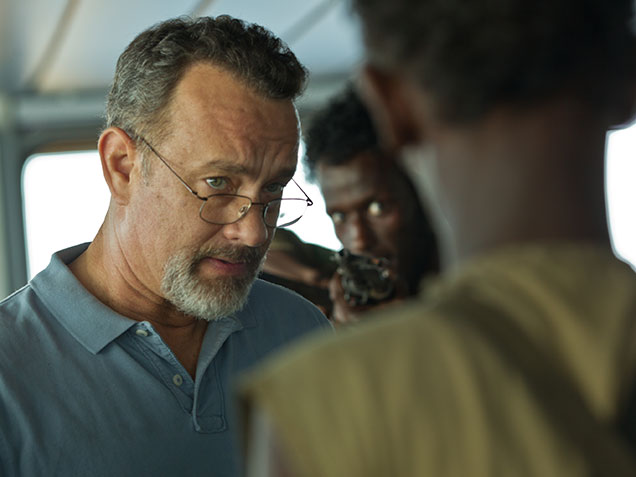By Savannah Wood
Rating: A
Captain Phillips opens with the titular character, Captain Richard Phillips (Tom Hanks) in his remarkably average home, driving to the airport in a minivan, discussing commonplace family matters. We understand from the get-go that Captain Phillips is not a man of any extraordinary means or background; he could be your dad, or your neighbor. Next, we travel across the sea to a small, austere village in Somalia. Men in jeeps with a stock-load of weapons, fearsome representatives of a Somalian warlord, pull up to intimidate the villagers. They demand money, tell the villagers that they have to commandeer a ship and hold it hostage for ransom. Muse, played by first time actor Barkhad Abdi, rounds up a team of outcasts, and they climb aboard a rickety boat and set out to find a target, eventually setting their sights on the USS Alabama, Phillips’ cargo craft. Abdi is lean and angular, with a kind of scrappy determination that entices you every bit as much as it chills you. He’s a proud man, but not a hateful one, and it’s his humanity that adds, that whets the edge of the action–it’s much more difficult to anticipate how a decent man in a desperate situation would act, over an outright monster.
Once it’s just Phillips and the pirates alone in the lifeboat is when the film really hit its stride in terms of demanding not just my attention, but my conscience. The dynamic between Phillips and the pirates was one of the more resonant elements of the film–there were no long heart-to-hearts, no moving confessions or hand-holding, but instead a grudging respect and understanding, conveyed through extremely brief moments of choice dialogue and expressive subtleties. Phillips looks at the ragged, tired Muse and tells him there must have been options other than the danger and instability of piracy. “Maybe in America,” Muse says.
Beneath these brief respites, however, the tension never leaves us. Every breath of air in the film is heavy laden with stress. Knowing how the film ends already, I wasn’t anticipating being particularly worried, but the extent to which it pulled me in and stretched at my nerves was astounding. Paul Greengrass (director of two Bourne films, and United 93), is no stranger to action and the call to fight. The camera moves in a jittery hand-held haze, Greengrass’s signature technique, and while it felt out of place in the more mundane moments at the beginning of the film, it eased into the action seamlessly and became an essential part of the magnification of tension in the dull heart-pounding rhythm of this sweaty, bloody experience.
Hanks will certainly be lauded for his performance, one of his best in a while. The staccato beats of his New England accent contrast heavily with the melodious cadence of Muse and his pirate cohorts; his face is a fairground of nuanced fear and determination. His unaffected, natural portrayal is not that of some tremendous hero, but rather an endearingly average man in an extraordinary situation, getting by as best he can.
All in all, every technical minutia and emotive display compiles into a comprehensively great film that’s every bit as much of an experience as it is a spectacle.
